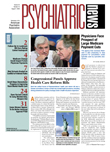A leading Senate committee and two House committees approved the first health reform bills in Congress in July. The House committees approved a unified version of a reform bill, and the Mental Health Liaison Group (MHLG), of which APA is a member, endorsed the House version (HR 3200), although both House and Senate bills included several provisions to improve insurance coverage for people with mental illness.
“This bill has numerous features that are good for our patients and good for the profession,” Nicholas Meyers, director of APA's Department of Government Relations, told Psychiatric News.
The endorsement by the MHLG of the $1.04 trillion bill was based in part on its inclusion of a mental health insurance parity requirement for all insurance plans—including policies for individuals—that will be part of a new insurance marketplace.
The endorsement came soon after approval of the bill by the House Ways and Means and the House Education and Labor committees. Approval of the bill by the final House panel with jurisdiction over health care, Energy and Commerce, was slowed by cost objections raised by some Democrats.
Meanwhile, the Senate Health, Education, Labor, and Pensions (HELP) Committee approved as-yet-unnumbered legislation to revamp health care, that also includes some parity protections.
The $615 billion HELP measure would expand coverage to nearly all U.S. residents by requiring that individuals get insurance and that employers contribute to the cost. All of the committee's Democrats voted in favor, while all of its Republicans voted against. The measure must be combined with a bill yet to be finalized in the Senate Finance Committee, which has jurisdiction over paying for the health care overhaul and over Medicare and Medicaid changes. The Finance Committee measure is expected to push the total cost of the Senate version well over $1 trillion.
The HELP panel was the first of five congressional committees to complete work on a major overhaul for the health care sector, which comprises one-sixth of the U.S. economy.
Democratic leaders were pushing to have each chamber vote on bills by August and complete a unified House-Senate bill by October.
In addition to its many other provisions, the HELP committee bill includes measures that aim to greatly expand treatment coverage for people with mental illness, including substance use disorders.
It also includes a prohibition on large group health insurers barring or restricting coverage for any individual based on either the applicant's or a family member's preexisting health conditions, such as mental illness.
“Too many Americans with preexisting conditions find themselves cherry-picked right out of the coverage they desperately need,” said Sen. Chris Dodd (D-Conn.), interim chair of the HELP committee. “And people with preexisting conditions who are lucky enough to be covered are trapped out of fear they won't be able to find other coverage. That's unacceptable.”
A key provision aimed at increasing insurance coverage is the bill's creation of a new health insurance exchange, or marketplace, where any individual or employer could buy coverage with at least minimum benefits. The measure requires that group insurers that offer insurance plans through the exchange abide by federal mental health parity requirements enacted in 2008. It is unlikely that the parity-law requirements also would apply to individual or small-group plans also offered under the exchange (see
Parity Prospects Improve in Senate Reform Bill).
Large group plans offered through the insurance exchange would have to include minimum types of coverage. It is unclear whether those minimum benefits will include mental health care, because the legislation allows the secretary of Health and Human Services to determine the minimum level of coverage for such plans. The secretary would receive recommendations on what minimal coverage to require in the exchange plans from a new “health care workforce commission,” which would include “health professionals,” but the details of that commission that have been made public have been sparse.
Although the bill does not mandate specific benefits for insurance plans within the new exchange, supporters hope that the creation of a new“ public option” insurance program, similar to Medicare, to compete with private plans within the exchange would encourage the broadest benefits possible.
“Passing a strong public option will keep insurance companies honest and ensure that all Americans have access to affordable health coverage,” said Sen. Sherrod Brown (D-Ohio), a member of the HELP committee, in a written statement. “By increasing competition in the insurance market, we can lower costs and expand insurance options.”
Other provisions of the Senate HELP Committee bill include
•
Allocation of $50 million to encourage the co-location of primary and specialty medical care in community-based mental health and behavioral health settings,
•
Creation of competitive grants for programs that promote individual and community health and prevent chronic disease, including mental illness,
•
Establishment of loan-repayment programs for clinicians who provide pediatric mental health services in areas designated as underserved,
•
Creation of mental health education and training grants for schools that train clinicians in child and adolescent mental health care,
•
Establishment of a public health sciences program to train“ physicians, dentists, nurses, physician assistants, mental and behavior health specialists, and public health professionals” in exchange for their agreement to serve in the U.S. Public Health Service, and
•
Launch of a primary care extension program to educate primary care providers about evidence-based therapies and mental health.
The bill's support of illness-prevention efforts was seen as a long-term, cost-control measure that could help curtail spiraling health care costs nationwide.
